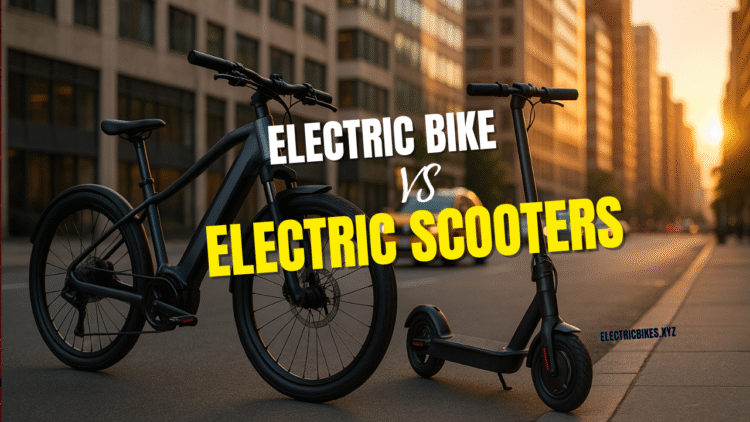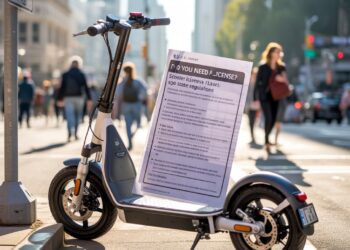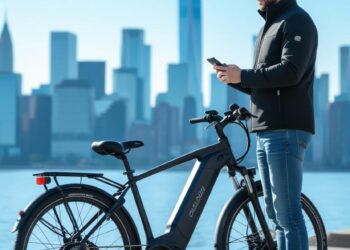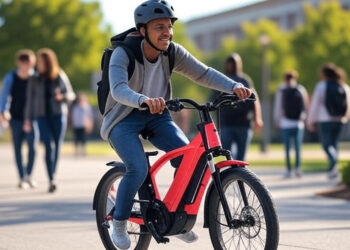When it comes to personal transport, the debate between electric bikes vs electric scooters is heating up fast—especially in cities across the USA and UK. With growing concerns around traffic, fuel prices, and the environment, more people are turning to these convenient, eco-friendly alternatives. But which one makes more sense for your lifestyle?
Whether you’re commuting in London traffic or cruising through LA streets, choosing between electric bikes and electric scooters comes down to more than just looks. It’s about comfort, range, terrain, laws, and yes—how much you’ll actually use it.
Let’s break it all down in a way that’s actually helpful (not confusing), so you can make the right call.
Electric Bikes vs Electric Scooters: A Real-World Comparison
Electric bikes (also known as e-bikes) and electric scooters (or e-scooters) both offer a smart way to move without relying on cars or public transport. But they’re built differently, ride differently, and suit different types of users.
While both use electric motors and rechargeable batteries, that’s about where the similarities end. One has pedals, gears, and feels more like traditional cycling. The other? Lightweight, zippy, and compact enough to carry indoors.
Before we dive deeper, here’s a side-by-side snapshot:
Electric Bikes vs Electric Scooters – Quick Comparison Table
| Feature | Electric Bikes | Electric Scooters |
|---|---|---|
| Speed Range | 15–28 mph (depending on class & model) | 10–20 mph |
| Range per Charge | 25–75 miles | 10–40 miles |
| Riding Comfort | High – seats, gears, suspension | Moderate – standing, basic suspension |
| Portability | Low – heavier and bulkier | High – foldable and light |
| Legal Access | Legal on most bike paths & roads | Restricted in some public areas |
| Physical Effort | Moderate (pedal-assist) | Low – all electric |
| Storage Needs | Requires bike rack or space | Can fit under desks or in cupboards |
| Weather Resistance | Generally better in rain | Less stable in wet conditions |
| Best For | Long commutes, exercise, hills | Short trips, flat city streets |
What Are Electric Bikes?
Electric bikes are bicycles with a motor built into the frame or wheel hub. Unlike scooters, e-bikes still let you pedal—either with full power assist or just enough to make climbing hills easier. Some models even let you ride with no assistance, like a regular bike.
One of the biggest perks of electric bikes is versatility. You can take them on bike paths, cycle lanes, and in many cases, even country roads. That’s a big deal for commuters and weekend riders alike.
Many people in both the UK and USA use electric bikes for fitness, too. They give you a light workout without overdoing it—ideal if you’re recovering from injury or just easing into a healthier lifestyle.
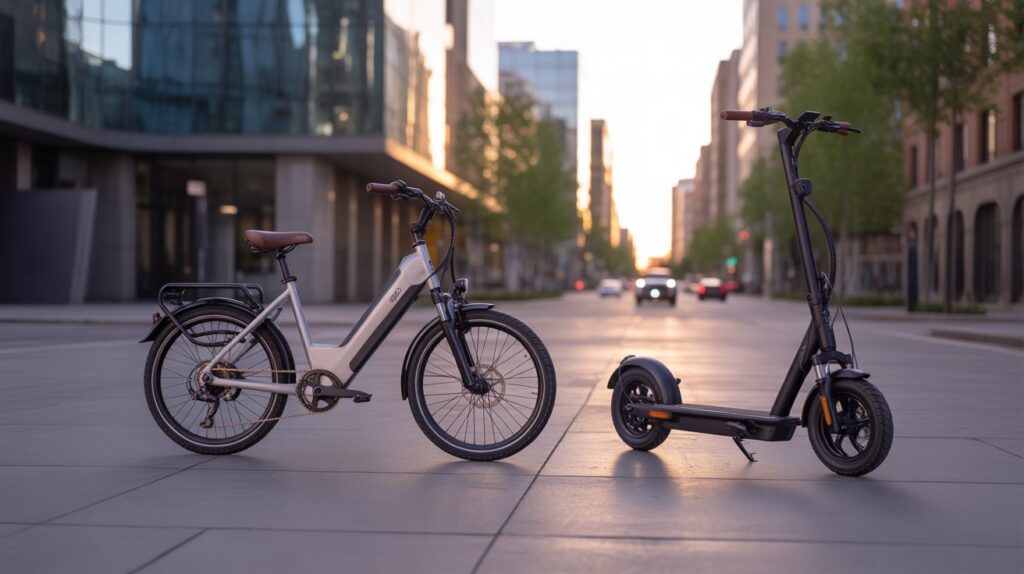
What About Electric Scooters?
Electric scooters are compact, battery-powered vehicles that are generally used while standing. They’re incredibly popular in urban settings like New York, Chicago, Manchester, and Birmingham, thanks to how lightweight and portable they are.
Need to hop on a train or store it in your apartment? No problem. Most electric scooters fold up in seconds, making them ideal for people who live in small spaces or want something they can carry upstairs.
But they do have limits. Compared to electric bikes, e-scooters tend to have shorter ranges and don’t handle rough terrain as well. And while they’re fast enough for city speeds, they’re not ideal for longer commutes or hilly areas.
Key Differences That Matter
1. Comfort and Ride Experience
When comparing electric bikes vs electric scooters, comfort is a huge factor. E-bikes usually win here. With bigger wheels, padded seats, and better suspension, they handle bumps, potholes, and long distances with ease.
Electric scooters, on the other hand, can feel jarring on rough roads. They’re great for short hops but not something you’d want to ride for 45 minutes straight.
2. Safety and Stability
Electric bikes have a more stable frame, wider tires, and better balance. This gives riders—especially beginners—a sense of control.
Electric scooters have smaller wheels and a standing-only design, which can feel shaky at high speeds or over uneven surfaces. Wet weather also makes scooter decks slippery.
3. Maintenance and Durability
An electric bike is built like a traditional bike, so it’s often easier to repair or upgrade parts. Local bike shops can handle most issues.
Electric scooters have more compact and proprietary parts. This can mean limited repair options or the need to ship it back to the manufacturer.
4. Portability
Scooters clearly win in terms of portability. You can fold them, stash them under a desk, or carry them on the train. Perfect for city life.
E-bikes are heavier (often 40–60 lbs), and while some are foldable, they’re not exactly backpack-friendly.
5. Legal Rules in USA & UK
In the UK, electric bikes are legal to ride on roads and cycle paths if they meet specific power and speed limits (250W motor and under 15.5 mph). No license or insurance is needed.
Electric scooters in the UK are currently only legal for hire on approved trial schemes—not for personal use on public roads.
In the USA, rules vary by state. Most allow electric bikes on roads and bike lanes. Scooters are more restricted and often banned from sidewalks or public parks.
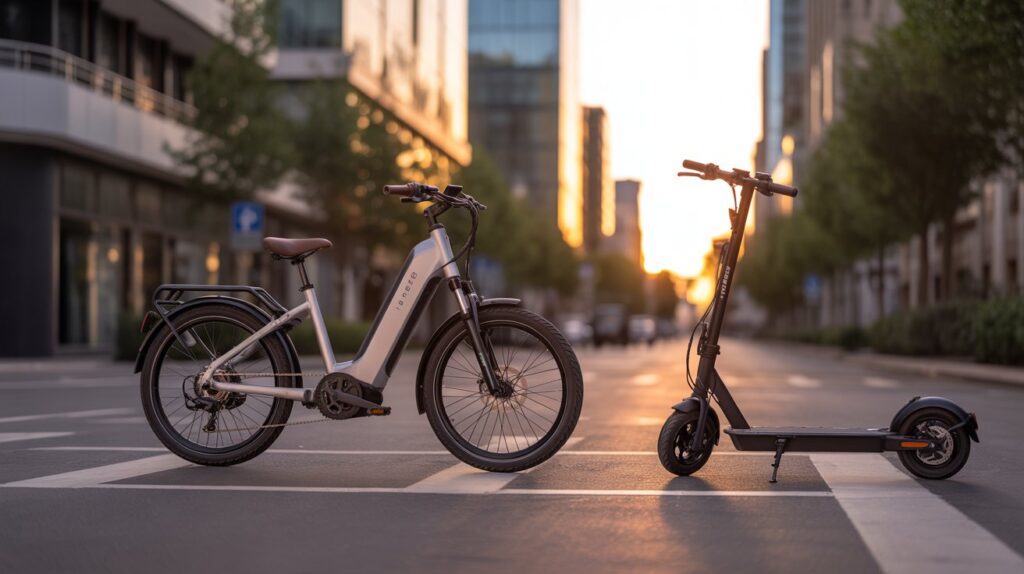
Pros and Cons
Electric Bikes:
✅ Pros:
- Longer range and higher speeds
- Great for hills and fitness
- Comfortable for longer rides
- Better safety and stability
❌ Cons:
- Heavier and harder to store
- Requires more maintenance
- Higher upfront investment
Electric Scooters:
✅ Pros:
- Super portable and lightweight
- Easy to store in tight spaces
- Low effort, easy learning curve
- Ideal for short urban trips
❌ Cons:
- Limited range and comfort
- Not ideal for poor road conditions
- Legal restrictions in some cities
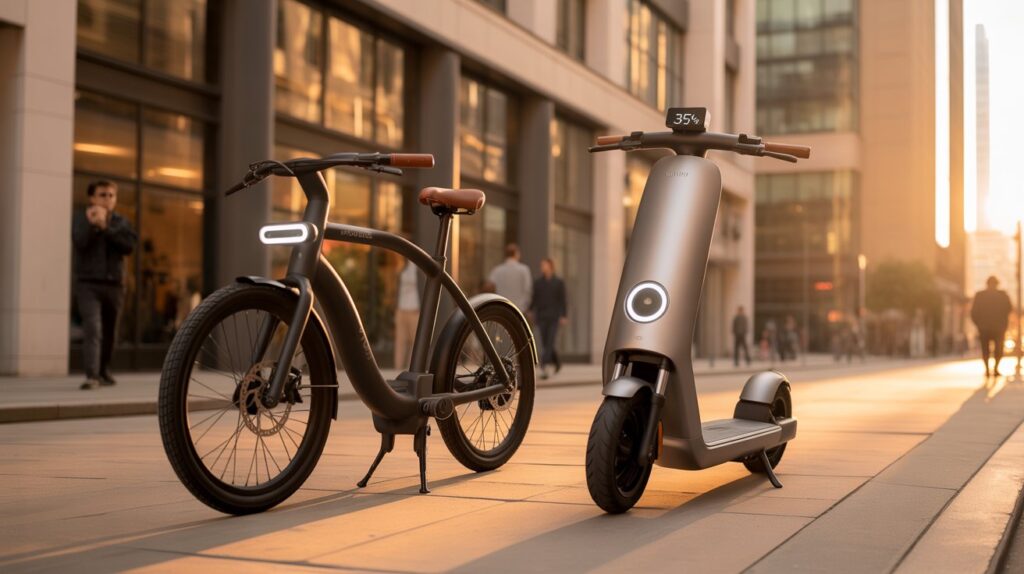
So, Which One Should You Choose?
If you’re after daily commuting power, need to cover longer distances, or prefer sitting down—go with an electric bike. They’re more versatile and better for varied terrain.
But if your commute is short, space is tight, or you need something super portable and fuss-free—an electric scooter might fit better.
Think about your route, storage options, and whether you’ll be combining it with public transport. That’s the real key when choosing between electric bikes vs electric scooters.
FAQs
Q1: Are electric bikes faster than electric scooters?
Yes, in most cases. Electric bikes typically reach speeds of 15–28 mph, while scooters max out around 10–20 mph depending on the model.
Q2: Which is better for commuting—electric bikes or electric scooters?
Electric bikes are generally better for longer commutes or mixed terrain. Scooters are ideal for short, flat urban trips where portability is key.
Q3: Can I ride electric bikes and scooters in the rain?
Electric bikes usually handle rain better due to larger tires and sealed components. Electric scooters can struggle in wet weather and may become slippery.
Q4: Which one lasts longer—an electric bike or an electric scooter?
Electric bikes tend to have longer lifespans and better durability. They’re built with more robust parts and are easier to maintain.
At the end of the day, there’s no one-size-fits-all answer in the electric bikes vs electric scooters debate. It really comes down to lifestyle, comfort, and how you plan to use it.
Both offer eco-friendly, efficient, and fun ways to travel. The right choice depends on your personal needs—and hopefully, now you’re a step closer to figuring that out.
Check out our previous guide on AFFORDABLE SCOOTERS THAT LOOK PREMIUM for more great options.

